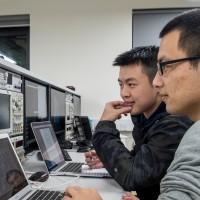About this course
We've changed some parts of this course for the 2020 to 2021 academic year due to coronavirus (COVID-19). These changes may affect how we'll teach you and which modules you'll take.
This course gives you the digital skills and industry experience to protect companies and governments from the rapidly increasing threat of cyber crime. Your skills will be in high demand when you graduate because of a global shortage of qualified cyber security professionals.
Applications for 2022 entry to this course are now closed to all applicants. View our undergraduate courses.
You’ll be taught by academics who are directly contributing to important advances in areas like blockchain and the Internet of Things.
The UK government’s National Cyber Security Centre recognises Southampton as a centre of excellence when it comes to research in this growth area.
As part of your master's, you will:
-
learn how to design, build and deliver software programs and systems
-
study in computer science labs recognised as an Academic Centre of Excellence in Cyber Security Research by the UK government
-
learn how to identify and address cyber security risks in software, internet-connected devices, web-based and networked systems
-
be taught by academic staff at the forefront of research
-
do an individual special project in year 3
-
take part in a group design project in year 4, working with an academic or an industry customer
The course is accredited by the British Computer Society and is one of just 3 UK integrated master's degrees to be provisionally certified by the National Cyber Security Centre (NCSC).
This MEng Computer Science with Cyber Security degree is also accredited by the Institution of Engineering and Technology on behalf of the Engineering Council for the purposes of fully meeting the academic requirement for registration as a Chartered Engineer.
Course location
This course is based at Highfield.
Awarding body
This qualification is awarded by the University of Southampton.
Download the Course Description Document
The Course Description Document details your course overview, your course structure and how your course is taught and assessed.
Changes due to COVID-19
Although the COVID-19 situation is improving, any future restrictions could mean we might have to change the way parts of our teaching and learning take place in 2021 to 2022. We're working hard to plan for a number of possible scenarios. This means that some of the information on this course page may be subject to change.
Find out more on our COVID advice page.
Entry requirements
For Academic year 202223
A-levels
A*AA including mathematics (minimum grade A)
or
A*A*B including mathematics (minimum grade A*)
or
AAAA including mathematics
A-levels additional information
Offers typically exclude General Studies and Critical Thinking. A pass in the science Practical is required where applicable.
A-levels with Extended Project Qualification
If you are taking an EPQ in addition to 3 A levels, you will receive the following offer in addition to the standard A level offer:
AAA including mathematics (minimum grade A), plus grade A in the EPQ
A-levels contextual offer
We are committed to ensuring that all applicants with the potential to succeed, regardless of their background, are encouraged to apply to study with us. The additional information gained through contextual data allows us to recognise an applicant's potential to succeed in the context of their background and experience. Applicants who are highlighted in this way will be made an offer which is lower than the typical offer for that programme, as follows: AAA including mathematics or A*AB including mathematics (minimum grade A)
International Baccalaureate Diploma
Pass, with 38 points overall, with 19 points required at Higher Level including 6 at Higher Level in Mathematics (Analysis and Approaches) or 7 at Higher Level in Mathematics (Applications and Interpretation)
International Baccalaureate contextual offer
We are committed to ensuring that all learners with the potential to succeed, regardless of their background, are encouraged to apply to study with us. The additional information gained through contextual data allows us to recognise a learner’s potential to succeed in the context of their background and experience. Applicants who are highlighted in this way will be made an offer which is lower than the typical offer for that programme.
International Baccalaureate Career Programme (IBCP) statement
Offers will be made on the individual Diploma Course subject(s) and the career-related study qualification. The CP core will not form part of the offer. Where there is a subject pre-requisite(s), applicants will be required to study the subject(s) at Higher Level in the Diploma course subject and/or take a specified unit in the career-related study qualification. Applicants may also be asked to achieve a specific grade in those elements.
Please see the University of Southampton International Baccalaureate Career-Related Programme (IBCP) Statement for further information. Applicants are advised to contact their Faculty Admissions Office for more information.
BTEC
D in the BTEC National Extended Certificate plus grades A*A in A-levels including mathematics (minimum grade A)
or
D* in the BTEC National Extended Certificate plus grades AA in A-levels including mathematics.
D*D in the BTEC National Diploma plus grade A in A-level mathematics
or
DD in the BTEC National Diploma plus grade A* in A-level mathematics.
We do not accept the BTEC National Extended Diploma without A-level Maths.
Applicants with a BTEC National Extended Diploma can apply for the Engineering/Physics/Mathematics/Geophysics Foundation Year.
RQF BTEC
We are committed to ensuring that all learners with the potential to succeed, regardless of their background, are encouraged to apply to study with us. The additional information gained through contextual data allows us to recognise a learner’s potential to succeed in the context of their background and experience.
Applicants who are highlighted in this way will be made an offer which is lower than the typical offer for that programme.
Additional information
Offers typically exclude General Studies and Critical Thinking. A pass in the science Practical is required where applicable.
QCF BTEC
D in the BTEC Subsidiary Diploma plus grades A*A in two A-levels including mathematics (minimum grade A)
or
D* in the BTEC Subsidiary Diploma plus grades AA in A-levels including mathematics.
D*D in the BTEC Diploma plus grade A in A-level mathematics
or
DD in the BTEC Diploma plus grade A* in A-level mathematics.
We do not accept the BTEC Extended Diploma without A-level Maths.
Applicants with a BTEC Extended Diploma can apply for the Engineering/Physics/Mathematics/Geophysics Foundation Year.
We are committed to ensuring that all learners with the potential to succeed, regardless of their background, are encouraged to apply to study with us. The additional information gained through contextual data allows us to recognise a learner’s potential to succeed in the context of their background and experience. Applicants who are highlighted in this way will be made an offer which is lower than the typical offer for that programme.
Access to HE Diploma
Applicants with an Access to HE Diploma should apply for the Engineering/Physics/Mathematics/Geophysics Foundation Year
Access to HE additional information
There are no additional requirements
Irish Leaving Certificate
Irish Leaving Certificate (first awarded 2017)
H1 H1 H1 H2 H2 H2, to include mathematics at H1
Irish Leaving Certificate (first awarded 2016)
A1 A1 A1 A2 A2 A2 including mathematics at A1
Irish certificate additional information
There are no additional requirements
Scottish Qualification
Offers will be based on exams being taken at the end of S6. Subjects taken and qualifications achieved in S5 will be reviewed. Careful consideration will be given to an individual’s academic achievement, taking in to account the context and circumstances of their pre-university education.
Please see the University of Southampton’s Curriculum for Excellence Scotland Statement (PDF) for further information. Applicants are advised to contact their Faculty Admissions Office for more information.
Cambridge Pre-U
D2, D3, D3 in three Principal subjects including mathematics
Cambridge Pre-U additional information
There are no additional requirements
Welsh Baccalaureate
A*AA including mathematics (minimum grade A)
or
A*A from two A-levels including mathematics (minimum grade A), and A from the Advanced Welsh Baccalaureate Skills Challenge CertificateorA*A*B including mathematics (minimum grade A*)orA*A* from two A-levels including mathematics, and B from the Advanced Welsh Baccalaureate Skills Challenge Certificate
Welsh Baccalaureate additional information
Offers typically exclude General Studies and Critical Thinking. A pass in the science Practical is required where applicable.
Welsh Baccalaureate contextual offer
We are committed to ensuring that all learners with the potential to succeed, regardless of their background, are encouraged to apply to study with us. The additional information gained through contextual data allows us to recognise a learner’s potential to succeed in the context of their background and experience. Applicants who are highlighted in this way will be made an offer which is lower than the typical offer for that programme.
European Baccalaureate
85% overall including grade 9/10 in mathematics
Other requirements
GCSE requirements
Applicants must hold GCSE English language (or GCSE English) (minimum grade 4/C) and mathematics (minimum grade 4/C)
Find the equivalent international qualifications for our entry requirements.
English language requirements
If English isn't your first language, you'll need to complete an International English Language Testing System (IELTS) to demonstrate your competence in English. You'll need all of the following scores as a minimum:
IELTS score requirements
- overall score
- 6.5
- reading
- 5.5
- writing
- 5.5
- speaking
- 5.5
- listening
- 5.5
We accept other English language tests. Find out which English language tests we accept.
You might meet our criteria in other ways if you do not have the qualifications we need. Find out more about:
-
our Access to Southampton scheme for students living permanently in the UK (including residential summer school, application support and scholarship)
-
skills you might have gained through work or other life experiences (otherwise known as recognition of prior learning)
Find out more about our Admissions Policy.
For Academic year 202324
A-levels
A*AA or AAAA including mathematics (minimum grade A). Alternatively, A*A*B including mathematics (minimum grade A*)
A-levels additional information
Offers typically exclude General Studies and Critical Thinking. A pass in the science Practical is required where it is separately endorsed. Applicants who have not studied mathematics at A-level can apply for the Engineering/Physics/Mathematics Foundation Year. Please visit theFoundation Year page for more information.
A-levels with Extended Project Qualification
If you are taking an EPQ in addition to 3 A levels, you will receive the following offer in addition to the standard A level offer: AAA including mathematics (minimum grade A), plus grade A in the EPQ
A-levels contextual offer
We are committed to ensuring that all applicants with the potential to succeed, regardless of their background, are encouraged to apply to study with us. The additional information gained through contextual data allows us to recognise an applicant's potential to succeed in the context of their background and experience. Applicants who are highlighted in this way will be made an offer which is lower than the typical offer for that programme, as follows: AAA including mathematics or A*AB including mathematics (minimum grade A)
International Baccalaureate Diploma
Pass, with 38 points overall, with 19 points required at Higher Level including 6 at Higher Level in Mathematics (Analysis and Approaches) or 7 at Higher Level in Mathematics (Applications and Interpretation)
International Baccalaureate Diploma additional information
Applicants who have not studied mathematics at Higher Level can apply for the Engineering/Physics/Mathematics Foundation Year. Please visit theFoundation Year page for more information.
International Baccalaureate contextual offer
We are committed to ensuring that all learners with the potential to succeed, regardless of their background, are encouraged to apply to study with us. The additional information gained through contextual data allows us to recognise a learner’s potential to succeed in the context of their background and experience. Applicants who are highlighted in this way will be made an offer which is lower than the typical offer for that programme.
International Baccalaureate Career Programme (IBCP) statement
Offers will be made on the individual Diploma Course subject(s) and the career-related study qualification. The CP core will not form part of the offer. Where there is a subject pre-requisite(s), applicants will be required to study the subject(s) at Higher Level in the Diploma course subject and/or take a specified unit in the career-related study qualification. Applicants may also be asked to achieve a specific grade in those elements. Please see the University of Southampton International Baccalaureate Career-Related Programme (IBCP) Statement for further information. Applicants are advised to contact their Faculty Admissions Office for more information.
BTEC
D in the BTEC National Extended Certificate plus grades A*A from two A-levels including mathematics (minimum grade A) or D* in the BTEC National Extended Certificate plus grades AA from two A-levels including mathematics D*D in the BTEC National Diploma plus grade A in A-level mathematics or DD in the BTEC National Diploma plus grade A* in A-level mathematics. We will consider the BTEC National Extended Diploma if studied alongside A-level mathematics.
RQF BTEC
We are committed to ensuring that all learners with the potential to succeed, regardless of their background, are encouraged to apply to study with us. The additional information gained through contextual data allows us to recognise a learner’s potential to succeed in the context of their background and experience. Applicants who are highlighted in this way will be made an offer which is lower than the typical offer for that programme.
Additional information
Offers typically exclude General Studies and Critical Thinking. A pass in the science Practical is required where it is separately endorsed. Applicants who have not studied mathematics at A-level can apply for the Engineering/Physics/Mathematics Foundation Year. Please visit theFoundation Year page for more information.
QCF BTEC
D in the BTEC Subsidiary Diploma plus grades A*A from two A-levels including mathematics (minimum grade A) or D* in the BTEC Subsidiary Diploma plus grades AA from 2 A-levels including mathematics. D*D in the BTEC Diploma plus grade A in A-level mathematics or DD in the BTEC Diploma plus grade A* in A-level mathematics. We will consider the BTEC Extended Diploma if studied alongside A-level mathematics.
We are committed to ensuring that all learners with the potential to succeed, regardless of their background, are encouraged to apply to study with us. The additional information gained through contextual data allows us to recognise a learner’s potential to succeed in the context of their background and experience. Applicants who are highlighted in this way will be made an offer which is lower than the typical offer for that programme.
Access to HE Diploma
Not accepted for this course. Applicants with an Access to HE Diploma in a relevant subject should apply for the Engineering/Physics/Mathematics Foundation Year. Please visit theFoundation Year page for more information.
Access to HE additional information
Irish Leaving Certificate
Irish Leaving Certificate (first awarded 2017)
H1 H1 H1 H2 H2 H2, to include mathematics at H1
Irish Leaving Certificate (first awarded 2016)
A1 A1 A1 A2 A2 A2 including mathematics at A1
Irish certificate additional information
Applicants who have not studied mathematics can apply for the Engineering/Physics/Mathematics Foundation Year. Please visit theFoundation Year page for more information.
Scottish Qualification
Offers will be based on exams being taken at the end of S6. Subjects taken and qualifications achieved in S5 will be reviewed. Careful consideration will be given to an individual’s academic achievement, taking in to account the context and circumstances of their pre-university education.
Please see the University of Southampton’s Curriculum for Excellence Scotland Statement (PDF) for further information. Applicants are advised to contact their Faculty Admissions Office for more information.
Cambridge Pre-U
D2, D3, D3 in three Principal subjects including mathematics
Cambridge Pre-U additional information
Cambridge Pre-U's can be used in combination with other qualifications such as A levels to achieve the equivalent of the typical offer, where D2 can be used in lieu of A-level grade A* or grade D3 can be used in lieu of A-level grade A. Applicants who have not studied the required Principal subjects can apply for the Engineering/Physics/Mathematics Foundation Year. Please visit theFoundation Year page for more information.
Welsh Baccalaureate
A*AA including mathematics (minimum grade A) or A*A from two A-levels including mathematics (minimum grade A), and A from the Advanced Welsh Baccalaureate Skills Challenge CertificateorA*A*B including mathematics (minimum grade A*)orA*A* from two A-levels including mathematics, and B from the Advanced Welsh Baccalaureate Skills Challenge Certificate
Welsh Baccalaureate additional information
A pass in the science Practical is required where it is separately endorsed. Offers typically exclude General Studies and Critical Thinking. Applicants who have not studied the required subjects at A-level can apply for the Engineering/Physics/Mathematics Foundation Year. Please visit theFoundation Year page for more information.
Welsh Baccalaureate contextual offer
We are committed to ensuring that all learners with the potential to succeed, regardless of their background, are encouraged to apply to study with us. The additional information gained through contextual data allows us to recognise a learner’s potential to succeed in the context of their background and experience. Applicants who are highlighted in this way will be made an offer which is lower than the typical offer for that programme.
European Baccalaureate
85% overall including grade 9/10 in mathematics (standard 5-period or advanced mathematics)
Other requirements
GCSE requirements
Applicants must hold GCSE English language (or GCSE English) (minimum grade 4/C) and mathematics (minimum grade 4/C)
You might meet our criteria in other ways if you do not have the qualifications we need. Find out more about:
-
our Access to Southampton scheme for students living permanently in the UK (including residential summer school, application support and scholarship)
-
skills you might have gained through work or other life experiences (otherwise known as recognition of prior learning)
Find out more about our Admissions Policy.
Got a question?
Please contact our enquiries team if you're not sure that you have the right experience or qualifications to get onto this course.
Email: enquiries@southampton.ac.uk
Tel: +44(0)23 8059 5000
Course structure
This accredited course is designed to give you industry experience alongside our research-led teaching. We encourage you to take a summer work placement in an industry of your choice, or even add a full year in industry, to help you gain the experience you need for accreditation.
All our computer science degree courses share the same compulsory modules in years 1 and 2, making it easy to switch between them. In the third and fourth years, you can tailor your degree by choosing optional modules.
Year 1 overview
You’ll study the logical and mathematical theory underpinning computer science. You’ll also get an understanding of the fundamentals of computer hardware.
As an introduction to software engineering, you’ll cover data structures and algorithms. You’ll also look at the principles of programming, including using object-oriented approaches and software engineering processes.
You’ll apply your knowledge by working on practical projects. For example, you’ll build algorithms and data analysis tools, and develop software user interfaces.
Year 2 overview
You’ll deepen your understanding of computer science by studying topics, such as artificial intelligence (AI), communication protocols and the TCP/IP layered model.
A group project will give you first-hand experience of working in a team, and of the issues of communication and scale in software engineering.
Year 3 overview
An individual project gives you the chance to conduct in-depth research in an area of computer science that interests you, under the supervision of an academic with expertise in your chosen field. This could involve designing, building and testing software or computer system.
You’ll take compulsory modules in cyber security systems and engineering management. You’ll specialise in cyber security, choosing from options such as cyber crime, cryptography and data mining.
You could also study a language, take modules from other disciplines such as psychology or chemistry, or choose from a range of innovative interdisciplinary modules.
Year 4 overview
You’ll take part in a group design project, working in a team that may include students from other engineering disciplines for a real industry or academic customer.
There is wide range of specialist modules to choose from. These cover topics such as biometrics, the dark web and e-business.
There is also a chance to study abroad for a semester.
Want more detail? See all the modules in the course.
Modules
Changes due to COVID-19
Although the COVID-19 situation is improving, any future restrictions could mean we might have to change the way parts of our teaching and learning take place in 2021 to 2022. We're working hard to plan for a number of possible scenarios. This means that some of the information on this course page may be subject to change.
Find out more on our COVID advice page.
For entry in Academic Year 2022-23
Year 1 modules
You must study the following modules in year 1:
This is a core module for computer science and software engineers. It teaches the basic data structures and algorithms which underpins modern software engineering. Without these algorithms most software would be hopelessly slow to the point of unusability...
This module aims to give students an understanding of the fundamentals of computer hardware and of the principles of operation of computers and peripheral devices. In addition, the module aims to give an overview of the main families of microprocessors an...
This module aims to: - Explain the role of database systems in information management - Introduce students to standard UNIX tools and techniques (e.g., vi editor, ed, sed and awk) - Develop the student's skills in the effective use of Unix tools for do...
The aim of this module is to help students develop an understanding of the fundamental professional, ethical, and legal issues and how they are being developed and applied. The lectures and associated courseworks will involve an active approach to the ...
The aim of this module is to teach the students advanced programming techniques using Java in order to support its use on other modules. C will also be taught in order to introduce explicit memory allocation and the use of pointers.
This module aims to introduce students to the principles of programming using an object oriented approach, and to provides them with the programming skills necessary to continue the study of computer science. Java is used as the introductory language.
This module aims to introduce students to the software engineering process, its tools, skills, and techniques, particularly modelling, validation and design. The focus will be on a principled, object-oriented process from requirements modelling and analys...
Year 2 modules
You must study the following modules in year 2:
This module will introduce you to the general principles and practices of developing software that interacts directly with the hardware and its physical environment. Software has found its way into almost any electronic device with a typical household ...
The networking aspect of this module will expose students to the principles of layered communication protocols, the architecture of the Internet, and the principles of how the components of the TCP/IP layered model are designed and operate. The distribute...
This module aims to give a broad introduction to the rapidly-developing field of artificial intelligence, and to cover the mathematical techniques used by this module and by other artificial intelligence modules in the computer science programme
This module aims to introduce students to recursion and to the principles of recursive, applicative and functional programming. In it, they will use various functional abstractions to control the complexity of programming, and will use abstraction mechani...
This module aims to give students experience of working in a team, and of the problems of communication and scale in software engineering. It will consolidate and integrate the techniques and concepts introduced in earlier courses (principally COMP1216 So...
This module aims to provide a broad and stimulating introduction to the theory of computing
Year 3 modules
You must study the following modules in year 3:
This module will provide students with an introduction to management and law – knowledge and skills which can be applied to the operations of an engineering-based organisation. The learning outcomes address: managerial decisions, commercial aspects of eng...
The individual project gives students the opportunity to gain both detailed knowledge and practical experience in a more focussed area than generally possible elsewhere in their degree programme. Most projects are in the nature of a challenging enginee...
The course requires to understand C code, assembly language, x86 architectures and memory allocation (a refresher will be provided).
This module will teach the principles of security in web and cloud based systems and how these principles apply in a range of different applications.
You must also choose from the following modules in year 3:
This module covers the development of modern computer architectures for servers, workstations, hand-held devices, signal processing and embedded systems from the introduction of the four-stage RISC pipeline to the present day.
This module is designed to be a follow-up module to the computer Science or ITO second year introductory networking module. The wireless networking part reviews wireless technologies and their application in areas such as IoT and sensor networks. The mod...
This module builds on the first year Data Management module to give students a deeper and broader view of the issues involved in database management systems, some of the most complex software in common use.
During the first two years of the degree students gain experience in a variety of 'traditional' programming languages in procedural, functional and object-oriented flavours. This module addresses the design and use of scripting languages for a contemporar...
Modern biology poses many challenging problems for the computer scientists. Rapid growth in instrumentation, and our ability to archive and distribute vast amounts of data, has significantly changed the way we attempt to understand cellular function, and ...
The challenge of computer vision is to develop a computer based system with the capabilities of the human eye-brain system. It is therefore primarily concerned with the problem of capturing and making sense of digital images. The field draws heavily on ma...
Machine Learning is about extracting useful information from large and complex datasets. The subject is a rich mixture of concepts from function analysis, statistical modelling and computational techniques. The module will cover the fundamental principles...
Games design and development is an increasingly important and sophisticated topic, that draws together many of the core aspects of Computer Science and Software Engineering. This course introduces students to the fundamentals of game design, gives them pr...
Machine Learning is about extracting useful information from large and complex datasets. The module will cover the practical basis of how learning algorithms are can be applied. You will gain hands-on experience in laboratory-bases sessions. Exclusions...
This module gives students an introduction to natural language processing (NLP) algorithms and an understanding of how to implement NLP applications.
The module introduces the operational research approach for modelling and solving engineering and management problems.
The module provides an introduction to the theory and practice of optimization techniques. It covers linear programming as well as nonlinear programming. This module is suitable to those who want to apply computational optimization methods to their proble...
This module gives a broad introduction to development of real-time and embedded systems
Robots are becoming more widely used in society, with applications ranging from agriculture through to manufacturing, with increasing interest in autonomous systems. This module will introduce students to the fundamentals of robotic systems including k...
Year 4 modules
You must study the following modules in year 4:
This module provides an introduction to intensive group project work in collaboration with an industrial or academic customer. Students work in groups of at least four people on a project typically based on an idea from an industrial partner, or from an a...
This module focuses on both theoretical and practical perspectives in the security of software and software systems, by exploring software analysis and reverse engineering. The aims of the module at a high level are to: - Explore common threats to ...
You must also choose from the following modules in year 4:
- To introduce key concepts in pattern recognition and machine learning; including specific algorithms for classification, regression, clustering and probabilistic modeling. - To give a broad view of the general issues arising in the application of algor...
This module covers concepts in programming languages that go beyond those typically seen or are new to mainstream languages. The goal is to encourage students to look beyond traditional programming practice by introducing new tools and techniques inspired...
This module: - Introduces the students to the key issues of interaction of multiple self-interested parties (a.k.a. agents) and gives a broad survey of topics at the interface of theoretical computer science and game theory dealing with such interactions...
This module aims to train students in both the principles and the practice of software verification. A range of verification approaches, including both testing and formal verification, will be covered. The use of logic as a specification language for prog...
This module lies at the intersection of robotics and biology. Through the abstraction of design principles from biological systems, it is possible to develop a range of core competences, including mechatronic systems, sensor and actuator technologies. By ...
Biometrics is about how we can recognise people automatically, by personal characteristic. We all have fingerprints and faces - and they are unique. We have to sense the information, process it and then deliver an assessment of the identity associated wit...
Financial markets form the source of a vast number of challenging computational problems. These are not only intellectually challenging from the point of view of computational modelling, but the financial sector is also an employer of a significant fracti...
This module covers the mathematics, techniques, and applications of modern cryptography. We will look at the history of code making and code breaking, and draw lessons for the future from the mistakes and successes of the past. We will also give a gentle ...
This module is designed to introduce you to the human dimension of cybercrime and cyber security. It is not coming from a technical perspective, but instead a critical criminological approach is applied to the topic. This means that we will be questioning...
The challenge of data mining is to transform raw data into useful information and actionable knowledge. Data mining is the computational process of discovering patterns in data sets involving methods at the intersection of artificial intelligence, machine...
Welcome to the Data Visualisation module! In this course, you would learn about the terminology, concepts and techniques behind visualising data, and will get to use a range of tools to get experience of creating visual representations of data. You will g...
Deep learning has revolutionised numerous fields in recent years. We've witnessed improvements in everything from computer vision through speech analysis to natural language processing as a result of the advent of massively parallel compute coupled with l...
Deep learning and differentiable programming has revolutionised numerous fields in recent years. We've witnessed improvements in everything from computer vision through speech analysis to natural language processing as a result of the advent of cheap GPGP...
We will study the tools and techniques used in digital forensics and its relevance to incident responses and criminal investigations. This will include: Network Traffic, Disk and Memory Forensics, Hardware Architectures, Forensics frameworks, Attributions...
Evolution by natural selection has created amazingly complex and sophisticated solutions to some very difficult problems - how exactly does it achieve this, and how can we harness this capability for engineering artificial systems and computational proble...
This module is useful to introduce: - Image processing and its relation to signal processing. - Image transformations for filtering, coding and etc. - Histogram processing algorithms to enhance image qualities and visibility. - Theories analysing and ...
The Individual Research Project is a 7.5 ECTS credit masters level module undertaken by independent study that allows students to demonstrate mastery of an advanced aspect of their discipline, including critical evaluation of current research and research...
This module gives a broad introduction to the new and rapidly expanding field of agent-based computing. It introduces the key concepts and models of the field, dealing both with the individual agents and with their interactions. Particular emphasis is pla...
The last decade and a half have seen the Web move away from a purely document-centric information system to one in which hypertext techniques are applied to the sort of data found in databases; the term “Semantic Web” is used to refer to this Web of linke...
Open data, pitched as the raw material of the new industrial revolution, holds great promise, but how do you exploit this new resource? This course is specifically designed to give students a greater understanding on how to innovate with open data. This ...
Simulation modelling plays an increasingly significant role across modern science and engineering, with the development of computational models becoming established practice in industry, consulting, and policy formulation. Computer scientists are often em...
The second generation of web sites that came along in the mid 2000's included many of the social media sites that are now household names (YouTube, Flickr, Wikipedia, Facebook, Blogger, Twitter, etc.) These sites (known at the time as Web 2.0) focused on ...
This module prepares students to develop an understanding of the critical issues and application of software project management. It introduces the students to the tools, techniques and body of knowledge involved in each stage of the project management lif...
This course is intended to give students an outline of how wireless communication and computer networks work "above the physical layer". This includes the interoperability of wireless networks such as WiMax/GPRS and WiFi to provide WiFi on trains etc. How...
Learning and assessment
The learning activities for this course include the following:
- lectures
- classes and tutorials
- coursework
- individual and group projects
- independent learning (studying on your own)
Course time
How you'll spend your course time:
Year 1
Study time
Your scheduled learning, teaching and independent study for year 1:
How we'll assess you
- coursework, laboratory reports and essays
- design and problem-solving exercises
- individual and group projects
- oral presentations
- written and practical exams
Your assessment breakdown
Year 1:
Year 2
Study time
Your scheduled learning, teaching and independent study for year 2:
How we'll assess you
- coursework, laboratory reports and essays
- design and problem-solving exercises
- individual and group projects
- oral presentations
- written and practical exams
Your assessment breakdown
Year 2:
Year 3
Study time
Your scheduled learning, teaching and independent study for year 3:
How we'll assess you
- coursework, laboratory reports and essays
- design and problem-solving exercises
- individual and group projects
- oral presentations
- written and practical exams
Your assessment breakdown
Year 3:
Year 4
Study time
Your scheduled learning, teaching and independent study for year 4:
How we'll assess you
- coursework, laboratory reports and essays
- design and problem-solving exercises
- individual and group projects
- oral presentations
- written and practical exams
Your assessment breakdown
Year 4:
Academic support
You’ll be supported by a personal academic tutor and have access to a senior tutor.
Course leader
Nicholas Gibbins is the course leader.
Careers
Most of our graduates go straight into computer science jobs in high-tech companies. Roles include: software engineer, app developer, web developer, and systems analyst. This master's course is also a great foundation for further study at PhD level.
Industry and government have an acute need for cyber security in a great variety of applications. You could become part of a team writing next-generation secure operating and communication systems, working to block the spread of malware, developing new defensive programming techniques, or work in government to protect national infrastructures or cyber defences.
Through our Cyber Security Academy you’ll also have regular contact with companies at the forefront of cyber security. Summer internships will help you build a strong professional profile, and set you up well for a cyber security career path.
Thanks to an extensive combination of networks, mentors, societies and our own on-campus startup incubator, we also support aspiring entrepreneurs looking to build their enterprise skills.
Our Computer Science graduates have secured roles at organisations including:
-
Apple
-
Microsoft
-
Cisco
-
Audi
-
Google
-
IBM
Roles include:
-
cyber security analyst
-
information security manager
-
network security analyst
-
penetration tester
-
cyber security consultant
This degree is accredited by the British Computer Society and the Institution of Engineering and Technology.
Careers services at Southampton
We are a top 20 UK university for employability (QS Graduate Employability Rankings 2019). Our Careers and Employability Service will support you throughout your time as a student and for up to 5 years after graduation. This support includes:
work experience schemes
CV and interview skills and workshops
networking events
careers fairs attended by top employers
a wealth of volunteering opportunities
study abroad and summer school opportunities
We have a vibrant entrepreneurship culture and our dedicated start-up supporter, Futureworlds, is open to every student.
Work in industry
A year in industry - sometimes known as a placement year or sandwich year - is a great way to give you a competitive edge among graduate recruiters. It shows that you can apply your academic skills and knowledge to the workplace, and helps you develop business and team-working skills. It can also connect you with employers, add value to your CV or even launch your career in a new direction.
The year in industry is taken after year 2 or year 3 and is assessed by academics and industry experts. There are reduced fees while you are on placement and you’ll get a salary from the company for the year. During the year you’ll have ongoing support from your teaching staff.
Fees, costs and funding
Tuition fees
Fees for a year's study:
- UK students pay £9,250.
- EU and international students pay £23,720.
What your fees pay for
Your tuition fees pay for the full cost of tuition and all examinations.
Find out how to:
Accommodation and living costs, such as travel and food, are not included in your tuition fees. Explore:
Bursaries, scholarships and other funding
If you're a UK or EU student and your household income is under £25,000 a year, you may be able to get a University of Southampton bursary to help with your living costs. Find out about bursaries and other funding we offer at Southampton.
If you're a care leaver or estranged from your parents, you may be able to get a specific bursary.
Get in touch for advice about student money matters.
Scholarships and grants
You may be able to get a scholarship or grant that's linked to your chosen subject area.
We award scholarships and grants for travel, academic excellence, or to students from underrepresented backgrounds.
Support during your course
The Student Services Centre offers support and advice on money to students. You may be able to access our Student Support fund and other sources of financial support during your course.
Funding for EU and international students
Find out about funding you could get as an international student.
How to apply
When you apply use:
- UCAS course code: II10
- UCAS institution code: S27
What happens after you apply?
We will assess your application on the strength of your:
- predicted grades
- academic achievements
- personal statement
- academic reference
We'll aim to process your application within two to six weeks, but this will depend on when it is submitted. Applications submitted in January, particularly near to the UCAS equal consideration deadline, might take substantially longer to be processed due to the high volume received at that time.
Equality and diversity
We treat and select everyone in line with our Equality and Diversity Statement.
Got a question?
Please contact our enquiries team if you're not sure that you have the right experience or qualifications to get onto this course.
Email: enquiries@southampton.ac.uk
Tel: +44(0)23 8059 5000
Related courses
- Courses
-
Student life
- Accommodation
- Our campuses
- Our cities
- Student community
- Sports and gyms
- Support and money
- Halls Filter
- Research
- Business
- Global
- Open days and visits
- Clearing
- Schools and colleges
- About
- Visit
- Alumni
- Departments
- News
- Events
- Contact








